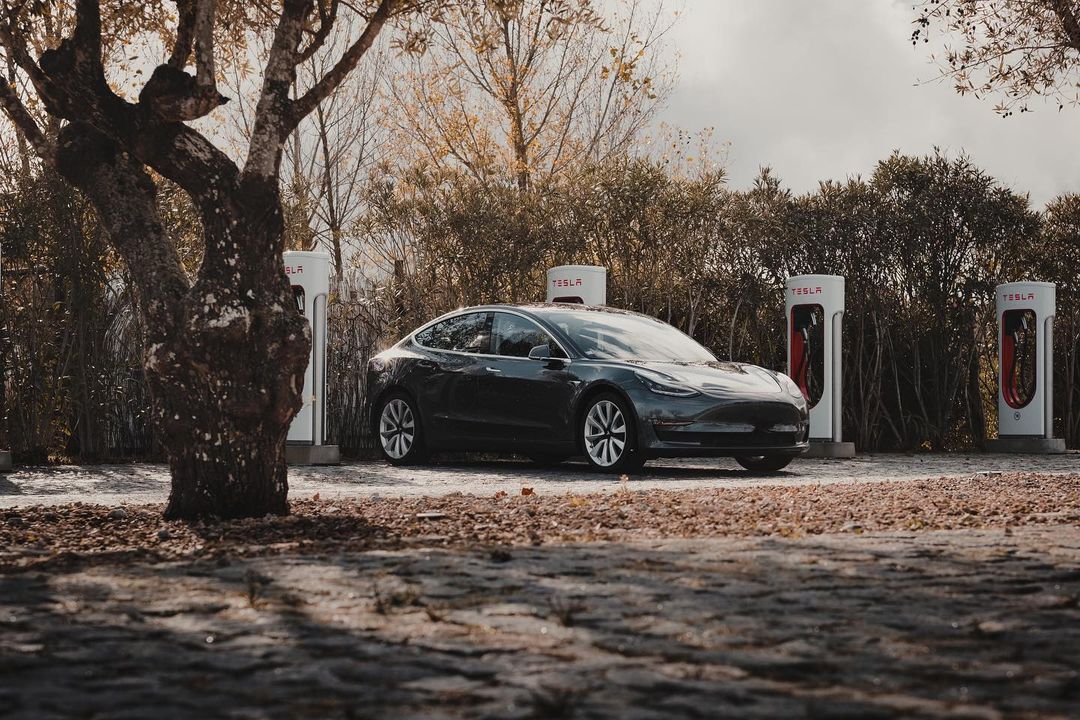
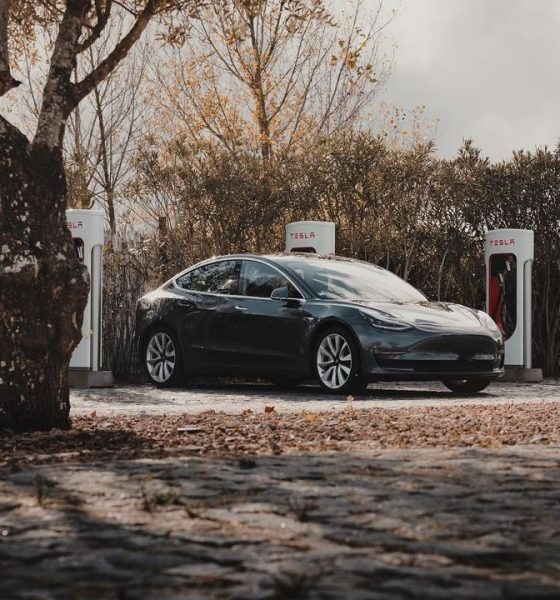
News
European EV market expected to slow as buyers await affordable models
Several parties are echoing concerns about the European electric vehicle (EV) market as some buyers await new, more affordable models that are just a few years out — and as significant economic uncertainty remains.
Sales of battery-electric vehicles (BEVs) jumped 47 percent in Europe throughout the first nine months of this year, according to Reuters. However, automakers including Mercedes-Benz, Volkswagen and Tesla have aired concerns about high interest rates putting off consumers and slowing EV growth.
According to AutoTrader, EVs in Britain are still roughly 33 percent more costly than their fossil fuel alternatives. Last week, Tesla announced plans to produce its next model, a €25,000/$25,000 EV, at its Gigafactory outside of Berlin, Germany. With the long-anticipated “affordable EV” on its way, some customers may be inclined to wait to buy, along with holding out for what they expect to be better products.
Volkswagen’s EV orders, as one example, were just half of what they were in 2022 during the same nine-month period. On Thursday, Volkswagen announced hopes to build a sub-$35,000 EV in the U.S. within the next three to four years.
Like many automakers, Tesla reported a slight delivery miss in Q3 compared to analyst expectations. However, the company had warned about sales slowing during the third quarter in its Q2 earnings call, and the company has still maintained its lofty delivery goal for Q4, which seems like a good sign.
Even beyond the economic environment and hopes for an affordable EV, data analysis firms and dealerships warn that buyers are holding off until they feel convinced that the technology meets their needs. Thomas Niedermayer, owner of a Bavarian dealership that has been in business for 45 years, notes that the fast-moving technology advancements may have some holding out for more future-proof EV options.
Credit: Reuters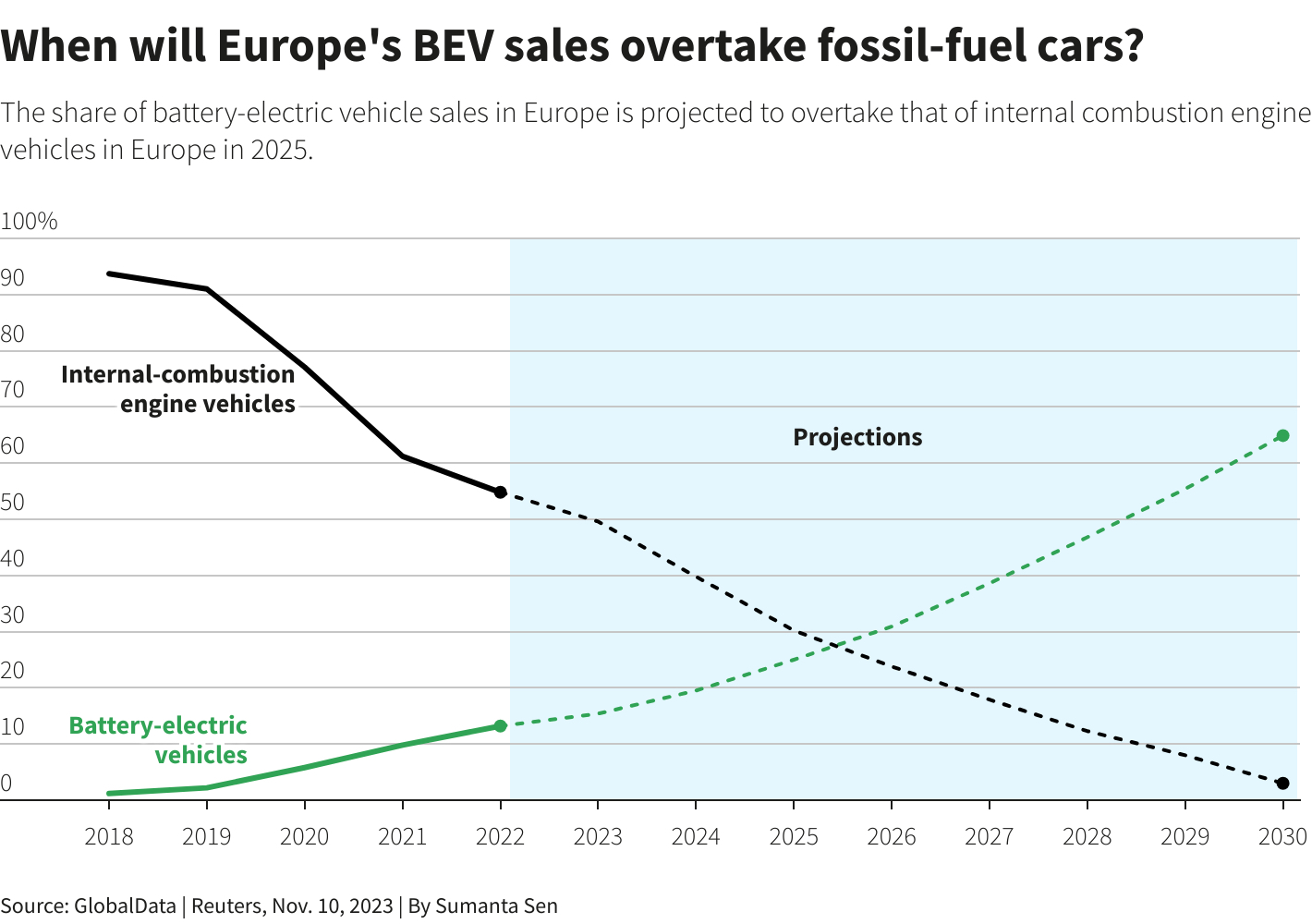
“The main problem is uncertainty,” Niedermayer said. “Many assume that the technology will improve and would rather wait three years for the next model than buy a vehicle now that will quickly lose value.”
Flavia Garcia and Tom Carvell in Edinburgh, Scotland, are in the market for a new vehicle as their 15-year-old Toyota Auris requires replacement. Ahead of gas car sales bans, the couple says they would consider purchasing an EV if it weren’t for fears of charging infrastructure deficiency, battery life and sticker price.
“You want to do the right thing for the environment, but it feels like you’re setting yourself up for a very expensive investment that will make your life that bit more complicated,” Garcia told Reuters. “We’ll probably get a hybrid first.”
EV sales also slowed in September, and Felipe Munoz of JATO Dynamics says the slowdown will remain until affordable EVs are released.
Meanwhile, Tesla’s Model Y was the top-selling vehicle across Europe in September, and the company last month announced it had delivered one million vehicles across the continent. The U.S. EV maker is also rolling out its Model 3 Highland in Europe, set to continue over the next couple of quarters.
Other U.S. automakers, including Ford and General Motors (GM), have recently announced plans to delay the launch of more affordable EVs and to cut back on EV spending as they cite low demand. Over the weekend, it was reported that Ford will no longer build a plant with LG in Turkey, with the slowed pace of EV adoption being the main reason for the canceled plans.
“From a regulatory standpoint, they don’t have to push product out right now – they can afford to focus on profitability,” says Alistair Bedwell, GlobalData’s head of powertrain forecasting. “But they need to have an eye on Tesla and the Chinese brands, because they don’t want to get too far behind.”
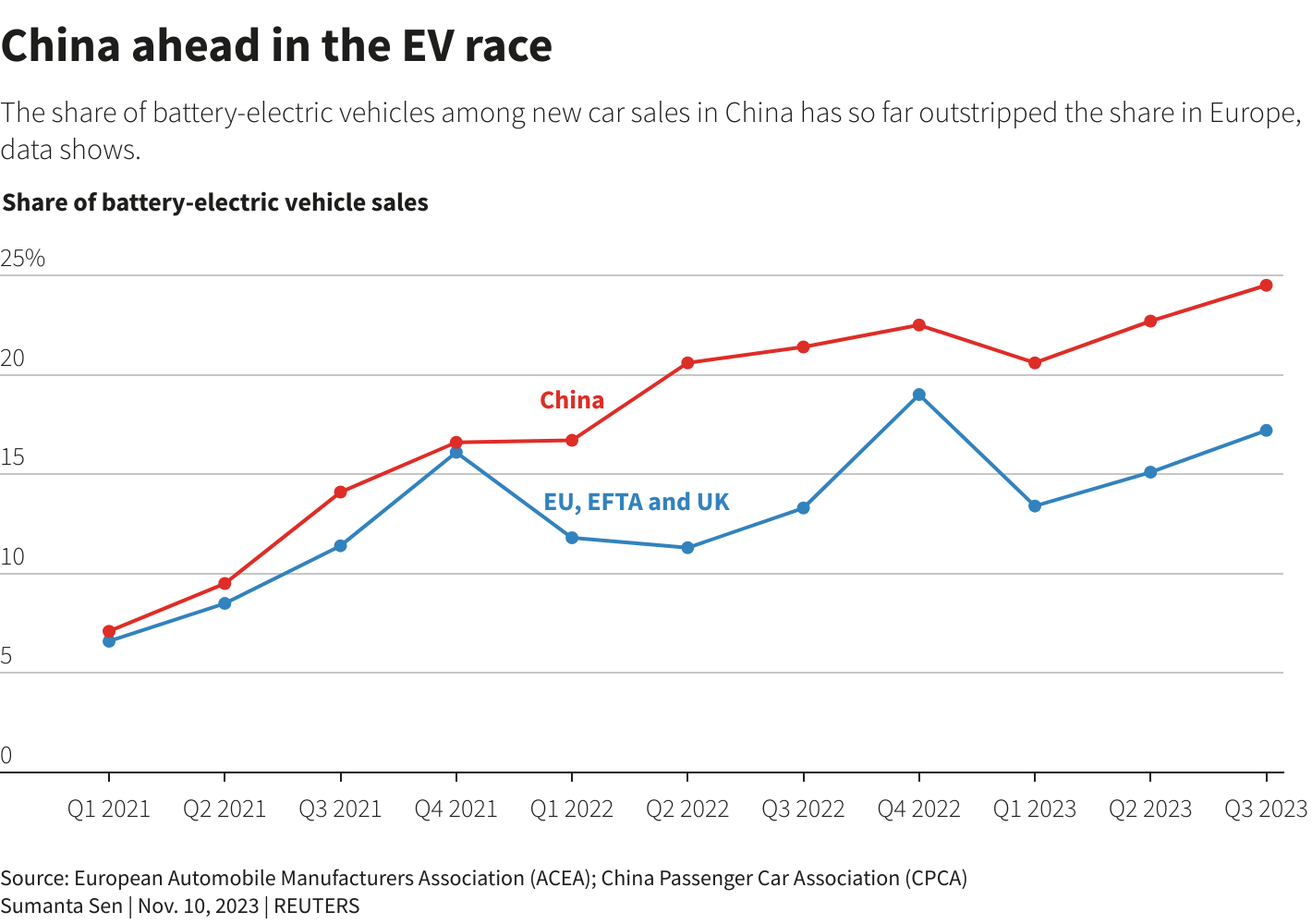
Credit: Reuters
According to a poll from the consumer research firm The Langston Co, hopes to buy an EV in Germany have remained steady in the past year, though rising sales suggest that some automakers have finally caught up to supply chain bottlenecks, according to Insights Manager Ben DuCharme.
Philip Nothard, insight director at dealer services firm Cox Automotive, says that concerns around low residual values have also lowered customer sentiment, with many choosing vehicle purchases based on what they think they can resell in a few years.
“We call it the valley of death, which we will be going through in 2024 to 2027: low residual values, high supply, and low demand,” Nothard said.
Tesla Model 3 and Y still dominating U.S. EV market, shows data
What are your thoughts? Let me know at zach@teslarati.com, find me on X at @zacharyvisconti, or send your tips to us at tips@teslarati.com.

News
Tesla FSD (Supervised) fleet passes 8.4 billion cumulative miles
The figure appears on Tesla’s official safety page, which tracks performance data for FSD (Supervised) and other safety technologies.

Tesla’s Full Self-Driving (Supervised) system has now surpassed 8.4 billion cumulative miles.
The figure appears on Tesla’s official safety page, which tracks performance data for FSD (Supervised) and other safety technologies.
Tesla has long emphasized that large-scale real-world data is central to improving its neural network-based approach to autonomy. Each mile driven with FSD (Supervised) engaged contributes additional edge cases and scenario training for the system.
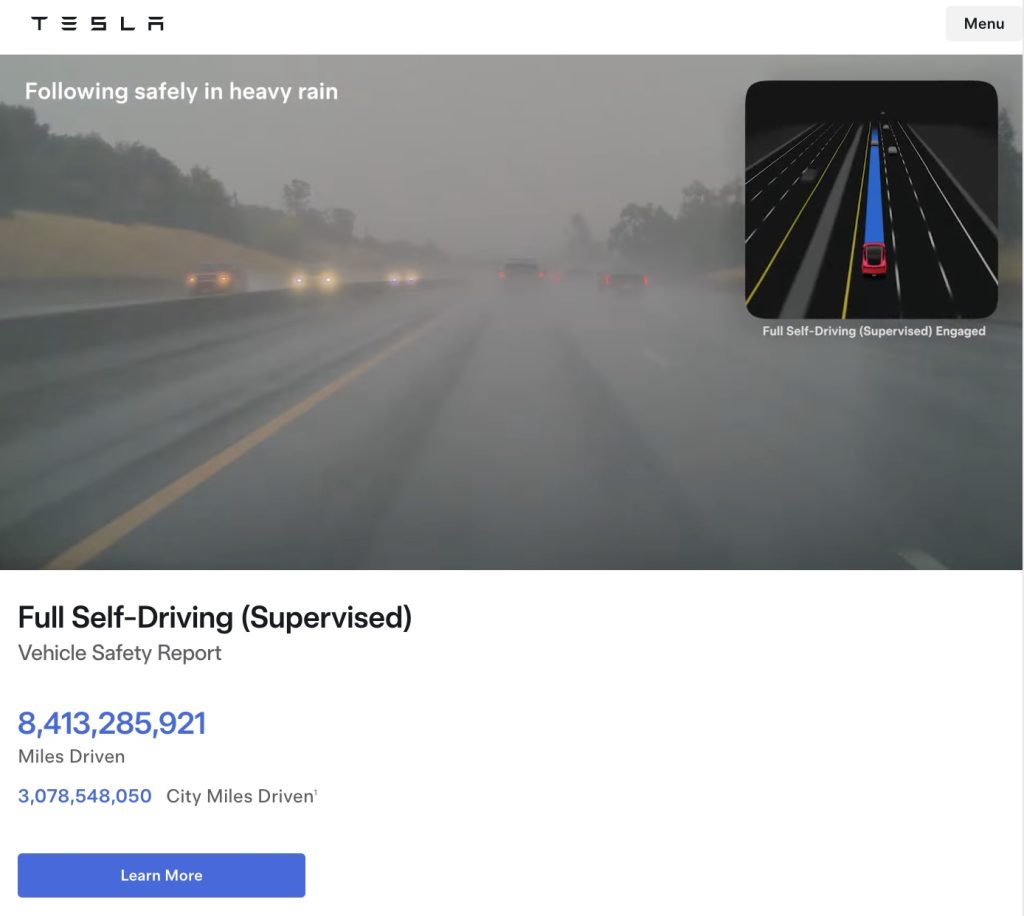
The milestone also brings Tesla closer to a benchmark previously outlined by CEO Elon Musk. Musk has stated that roughly 10 billion miles of training data may be needed to achieve safe unsupervised self-driving at scale, citing the “long tail” of rare but complex driving situations that must be learned through experience.
The growth curve of FSD Supervised’s cumulative miles over the past five years has been notable.
As noted in data shared by Tesla watcher Sawyer Merritt, annual FSD (Supervised) miles have increased from roughly 6 million in 2021 to 80 million in 2022, 670 million in 2023, 2.25 billion in 2024, and 4.25 billion in 2025. In just the first 50 days of 2026, Tesla owners logged another 1 billion miles.
At the current pace, the fleet is trending towards hitting about 10 billion FSD Supervised miles this year. The increase has been driven by Tesla’s growing vehicle fleet, periodic free trials, and expanding Robotaxi operations, among others.
With the fleet now past 8.4 billion cumulative miles, Tesla’s supervised system is approaching that threshold, even as regulatory approval for fully unsupervised deployment remains subject to further validation and oversight.
Elon Musk
Elon Musk fires back after Wikipedia co-founder claims neutrality and dubs Grokipedia “ridiculous”
Musk’s response to Wales’ comments, which were posted on social media platform X, was short and direct: “Famous last words.”
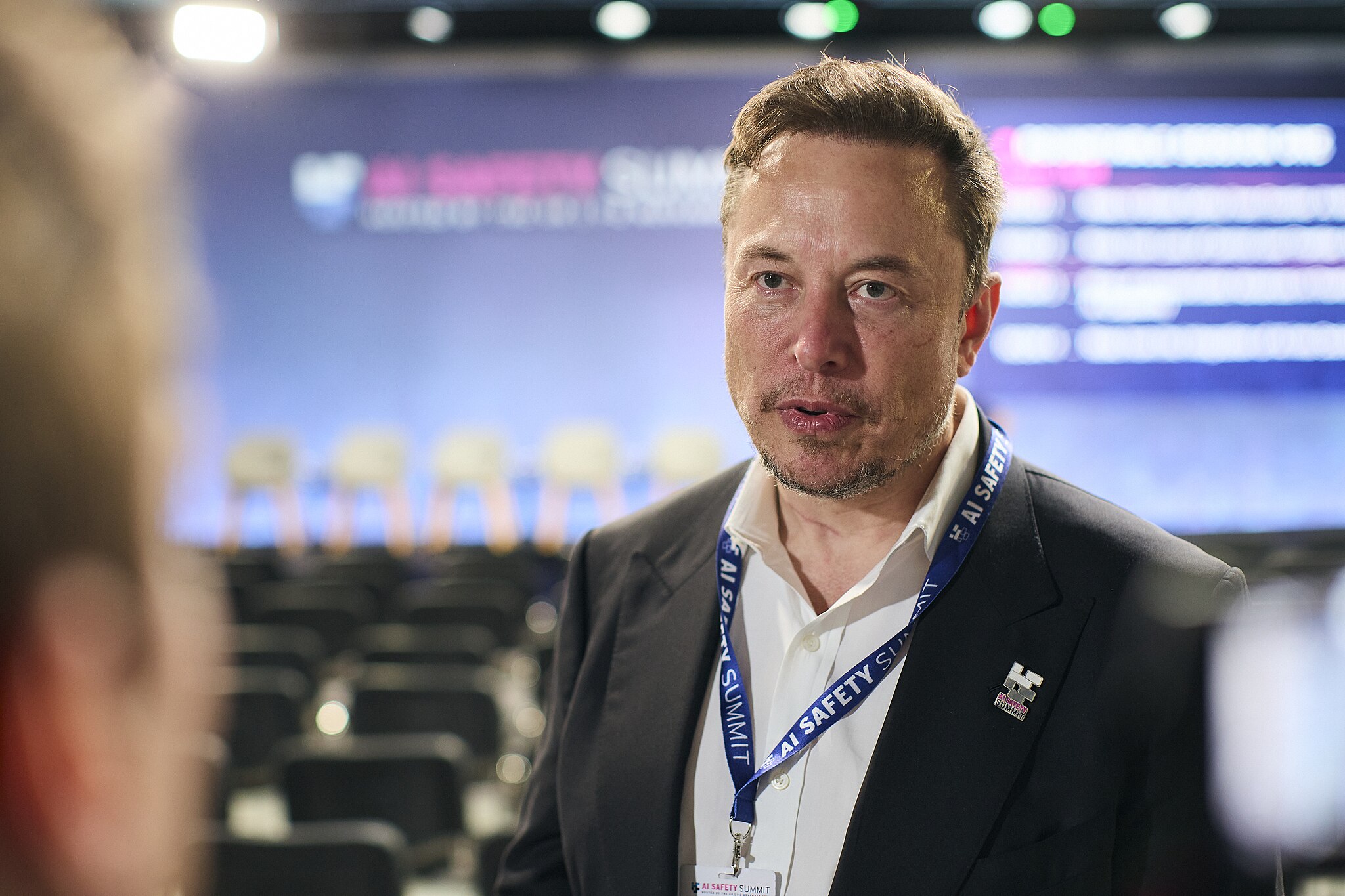
Elon Musk fired back at Wikipedia co-founder Jimmy Wales after the longtime online encyclopedia leader dismissed xAI’s new AI-powered alternative, Grokipedia, as a “ridiculous” idea that is bound to fail.
Musk’s response to Wales’ comments, which were posted on social media platform X, was short and direct: “Famous last words.”
Wales made the comments while answering questions about Wikipedia’s neutrality. According to Wales, Wikipedia prides itself on neutrality.
“One of our core values at Wikipedia is neutrality. A neutral point of view is non-negotiable. It’s in the community, unquestioned… The idea that we’ve become somehow ‘Wokepidea’ is just not true,” Wales said.
When asked about potential competition from Grokipedia, Wales downplayed the situation. “There is no competition. I don’t know if anyone uses Grokipedia. I think it is a ridiculous idea that will never work,” Wales wrote.
After Grokipedia went live, Larry Sanger, also a co-founder of Wikipedia, wrote on X that his initial impression of the AI-powered Wikipedia alternative was “very OK.”
“My initial impression, looking at my own article and poking around here and there, is that Grokipedia is very OK. The jury’s still out as to whether it’s actually better than Wikipedia. But at this point I would have to say ‘maybe!’” Sanger stated.
Musk responded to Sanger’s assessment by saying it was “accurate.” In a separate post, he added that even in its V0.1 form, Grokipedia was already better than Wikipedia.
During a past appearance on the Tucker Carlson Show, Sanger argued that Wikipedia has drifted from its original vision, citing concerns about how its “Reliable sources/Perennial sources” framework categorizes publications by perceived credibility. As per Sanger, Wikipedia’s “Reliable sources/Perennial sources” list leans heavily left, with conservative publications getting effectively blacklisted in favor of their more liberal counterparts.
As of writing, Grokipedia has reportedly surpassed 80% of English Wikipedia’s article count.
News
Tesla Sweden appeals after grid company refuses to restore existing Supercharger due to union strike
The charging site was previously functioning before it was temporarily disconnected in April last year for electrical safety reasons.
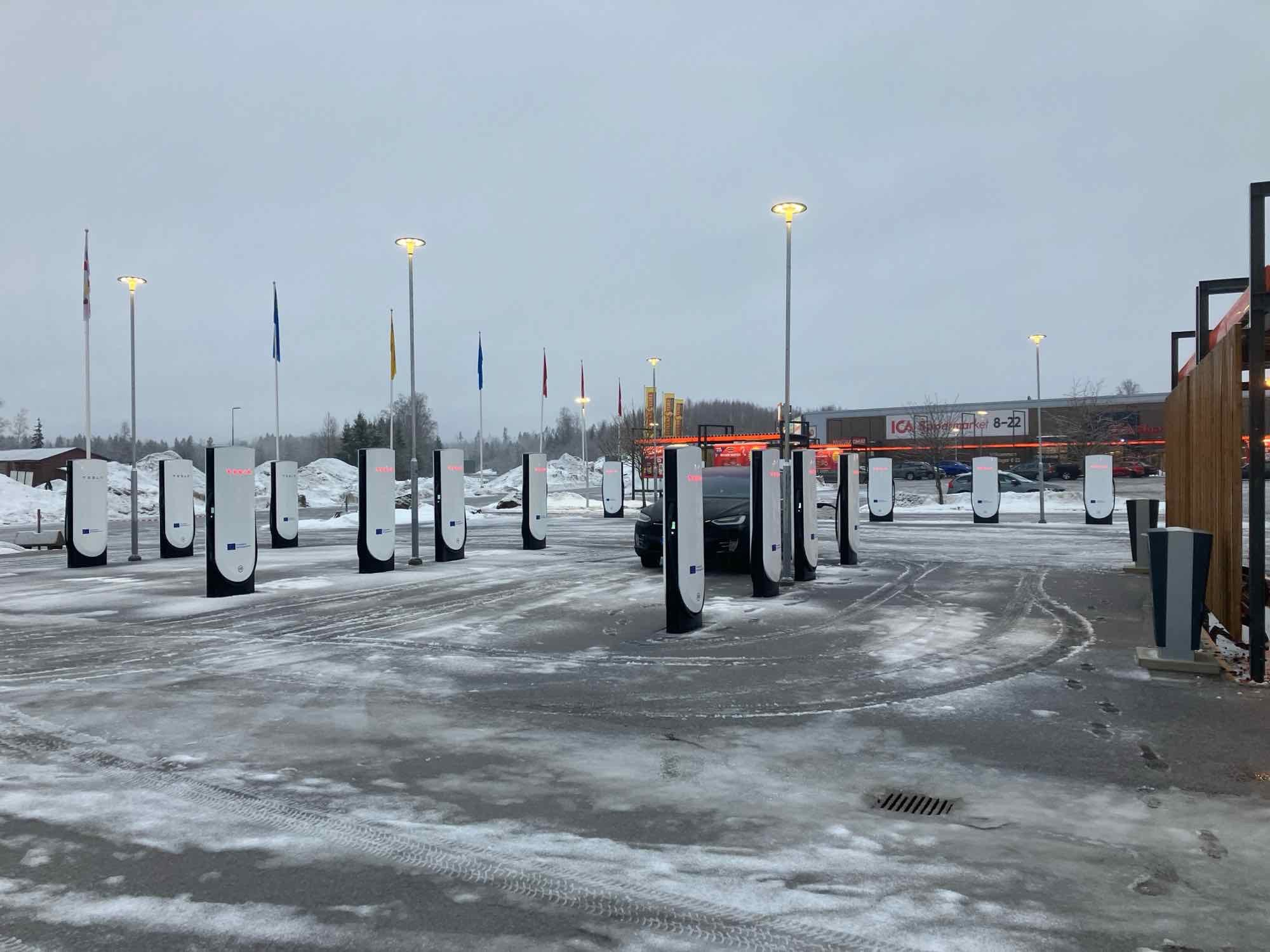
Tesla Sweden is seeking regulatory intervention after a Swedish power grid company refused to reconnect an already operational Supercharger station in Åre due to ongoing union sympathy actions.
The charging site was previously functioning before it was temporarily disconnected in April last year for electrical safety reasons. A temporary construction power cabinet supplying the station had fallen over, described by Tesla as occurring “under unclear circumstances.” The power was then cut at the request of Tesla’s installation contractor to allow safe repair work.
While the safety issue was resolved, the station has not been brought back online. Stefan Sedin, CEO of Jämtkraft elnät, told Dagens Arbete (DA) that power will not be restored to the existing Supercharger station as long as the electric vehicle maker’s union issues are ongoing.
“One of our installers noticed that the construction power had been backed up and was on the ground. We asked Tesla to fix the system, and their installation company in turn asked us to cut the power so that they could do the work safely.
“When everything was restored, the question arose: ‘Wait a minute, can we reconnect the station to the electricity grid? Or what does the notice actually say?’ We consulted with our employer organization, who were clear that as long as sympathy measures are in place, we cannot reconnect this facility,” Sedin said.
The union’s sympathy actions, which began in March 2024, apply to work involving “planning, preparation, new connections, grid expansion, service, maintenance and repairs” of Tesla’s charging infrastructure in Sweden.
Tesla Sweden has argued that reconnecting an existing facility is not equivalent to establishing a new grid connection. In a filing to the Swedish Energy Market Inspectorate, the company stated that reconnecting the installation “is therefore not covered by the sympathy measures and cannot therefore constitute a reason for not reconnecting the facility to the electricity grid.”
Sedin, for his part, noted that Tesla’s issue with the Supercharger is quite unique. And while Jämtkraft elnät itself has no issue with Tesla, its actions are based on the unions’ sympathy measures against the electric vehicle maker.
“This is absolutely the first time that I have been involved in matters relating to union conflicts or sympathy measures. That is why we have relied entirely on the assessment of our employer organization. This is not something that we have made any decisions about ourselves at all.
“It is not that Jämtkraft elnät has a conflict with Tesla, but our actions are based on these sympathy measures. Should it turn out that we have made an incorrect assessment, we will correct ourselves. It is no more difficult than that for us,” the executive said.








